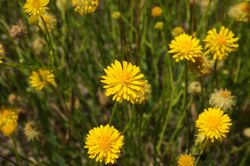Biology:Calotis lappulacea
| Yellow burr-daisy | |
|---|---|

| |
| Scientific classification | |
| Kingdom: | Plantae |
| Clade: | Tracheophytes |
| Clade: | Angiosperms |
| Clade: | Eudicots |
| Clade: | Asterids |
| Order: | Asterales |
| Family: | Asteraceae |
| Genus: | Calotis |
| Species: | C. lappulacea
|
| Binomial name | |
| Calotis lappulacea Benth.[1]
| |
Calotis lappulacea, commonly known as the yellow burr-daisy,[2] is a flowering plant in the family Asteraceae found in many parts of mainland Australia. It is a small, perennial herb with yellow globular flower-heads.
Description
Calotis lappulacea is slender, upright or straggling, multi-branched perennial or small under-storey shrub to 20–50 cm (7.9–19.7 in) high. The stems and leaves are sparsely covered with coarse, rough to flattened, straight, rigid hairs. The leaves are oblong to narrowly egg-shaped, sessile, 4–20 mm (0.16–0.79 in) long, 1–4 mm (0.039–0.157 in) wide, entire or deeply divided, mostly toothed toward the apex and basal leaves. The globular-shaped flowers are at the end of upright stems, 3–8 mm (0.12–0.31 in) in diameter, florets 40-60, yellow and 2–4 mm (0.079–0.157 in) long. Flowering occurs mostly from September to January but may flower throughout the year. The fruit is an achene, flattened, warty, spiny and about 1.5 mm (0.059 in) long.[2][3][4]
Taxonomy and naming
The specific epithet "lappulacea" refers to the genus Lappula of stiffly hairy plants. The yellow burr-daisy first appeared in scientific literature in 1837, published by the systematic botanist George Bentham from a specimen collected by Ferdinand Bauer.[5][6][7]
Distribution and habitat
Yellow burr-daisy is a widespread species growing on a variety of soils including dry rocky situations, on heavy clay soils and occasionally in woodland in the Australian Capital Territory, Northern Territory and all mainland states of Australia.[3][4][8]
References
- ↑ "Calotis lappulacea". Australian Plant Census. https://biodiversity.org.au/nsl/services/apc-format/display/101116.
- ↑ 2.0 2.1 Sharp, Sarah; Rehwinkel, Rainer; Mallinson, Dave; Eddy, David (2015). Woodland Flora a Field Guide for the Southern Tableland (NSW & ACT). Canberra: Horizons Print Management. ISBN 9780994495808.
- ↑ 3.0 3.1 Everett, J.. "Calotis lappulacea". Royal Botanic Gardens Sydney. https://plantnet.rbgsyd.nsw.gov.au/cgi-bin/NSWfl.pl?page=nswfl&lvl=sp&name=Calotis~lappulacea.
- ↑ 4.0 4.1 "Calotis lappulacea". Royal Botanic Gardens Sydney. https://vicflora.rbg.vic.gov.au/flora/taxon/8eaf3841-de79-494b-bba1-6daf33ab9e71.
- ↑ J. Everett. "Calotis lappulacea". PlantNet. NSW Flora Online. https://plantnet.rbgsyd.nsw.gov.au/cgi-bin/NSWfl.pl?page=nswfl&lvl=sp&name=Calotis~lappulacea.
- ↑ "Calotis lappulacea". Vascular Plants Australian Plant Name Index (APNI). https://biodiversity.org.au/nsl/services/rest/instance/apni/528524.
- ↑ Les Robinson - Field Guide to the Native Plants of Sydney, ISBN:978-0-7318-1211-0 page 133
- ↑ Cosgrove, Meredith (2014). Photographic Guide to Native Plants of the Australian Capital Territory. Meadow Argus. p. 31. ISBN 9780994183408.
Wikidata ☰ Q15554963 entry
 |

